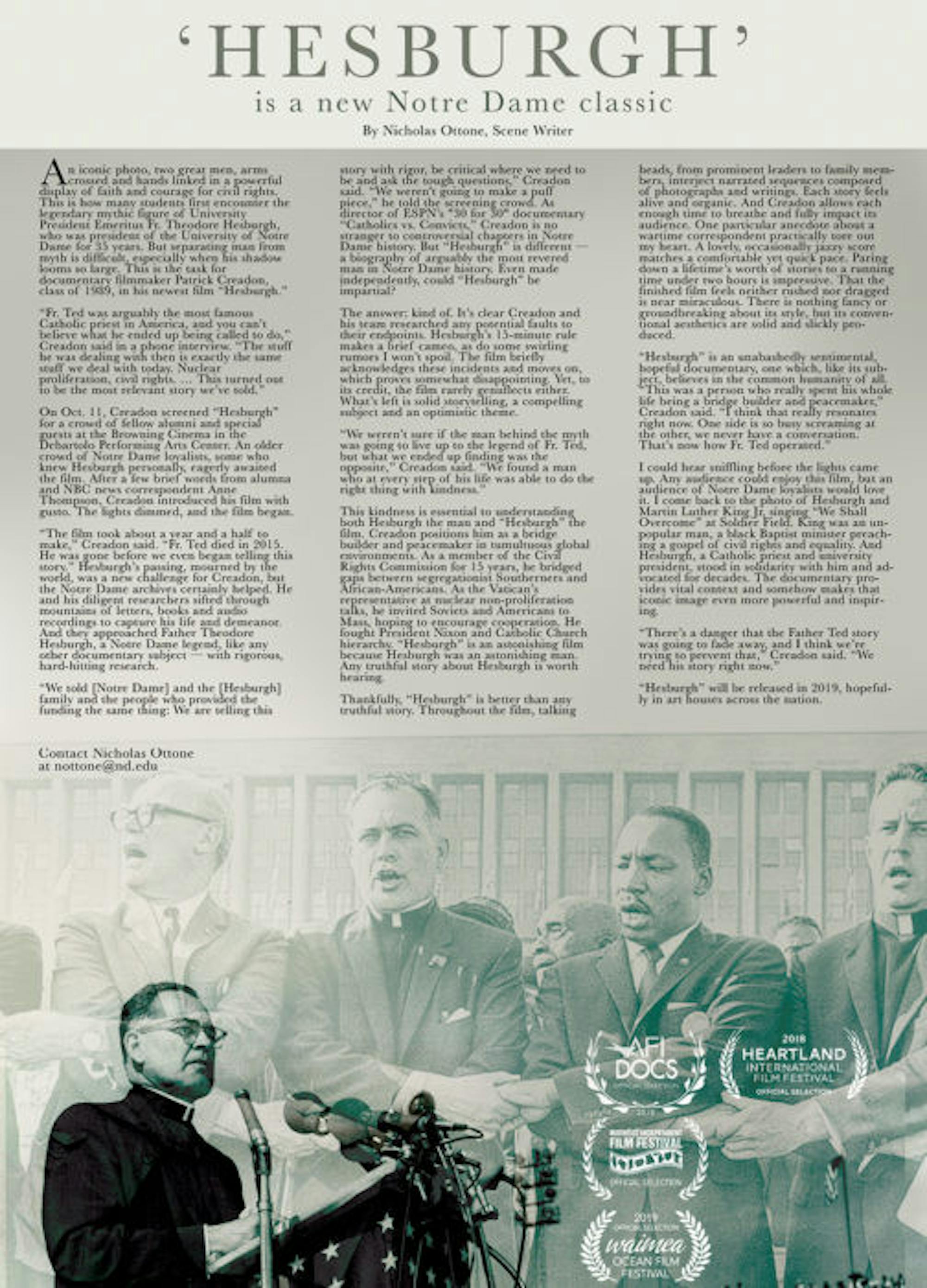
An iconic photo, two great men, arms crossed and hands linked in a powerful display of faith and courage for civil rights. This is how many students first encounter the legendary mythic figure of University President Emeritus Fr. Theodore Hesburgh, who was president of the University of Notre Dame for 35 years. But separating man from myth is difficult, especially when his shadow looms so large. This is the task for documentary filmmaker Patrick Creadon, class of 1989, in his newest film “Hesburgh.”
“Fr. Ted was arguably the most famous Catholic priest in America, and you can’t believe what he ended up being called to do,” Creadon said in a phone interview. “The stuff he was dealing with then is exactly the same stuff we deal with today. Nuclear proliferation, civil rights. … This turned out to be the most relevant story we’ve told.”
On Oct. 11, Creadon screened “Hesburgh” for a crowd of fellow alumni and special guests at the Browning Cinema in the Debartolo Performing Arts Center. An older crowd of Notre Dame loyalists, some who knew Hesburgh personally, eagerly awaited the film. After a few brief words from alumna and NBC news correspondent Anne Thompson, Creadon introduced his film with gusto. The lights dimmed, and the film began.
“The film took about a year and a half to make,” Creadon said. “Fr. Ted died in 2015. He was gone before we even began telling this story.” Hesburgh’s passing, mourned by the world, was a new challenge for Creadon, but the Notre Dame archives certainly helped. He and his diligent researchers sifted through mountains of letters, books and audio recordings to capture his life and demeanor. And they approached Father Theodore Hesburgh, a Notre Dame legend, like any other documentary subject — with rigorous, hard-hitting research.
“We told [Notre Dame] and the [Hesburgh] family and the people who provided the funding the same thing: We are telling this story with rigor, be critical where we need to be and ask the tough questions,” Creadon said. “We weren't going to make a puff piece,” he told the screening crowd. As director of ESPN’s "30 for 30" documentary “Catholics vs. Convicts,” Creadon is no stranger to controversial chapters in Notre Dame history. But “Hesburgh” is different — a biography of arguably the most revered man in Notre Dame history. Even made independently, could “Hesburgh” be impartial?
The answer: kind of. It’s clear Creadon and his team researched any potential faults to their endpoints. Hesburgh’s 15-minute rule makes a brief cameo, as do some swirling rumors I won’t spoil. The film briefly acknowledges these incidents and moves on, which proves somewhat disappointing. Yet, to its credit, the film rarely genuflects either. What’s left is solid storytelling, a compelling subject and an optimistic theme.
“We weren’t sure if the man behind the myth was going to live up to the legend of Fr. Ted, but what we ended up finding was the opposite,” Creadon said. “We found a man who at every step of his life was able to do the right thing with kindness.”
This kindness is essential to understanding both Hesburgh the man and “Hesburgh” the film. Creadon positions him as a bridge builder and peacemaker in tumultuous global environments. As a member of the Civil Rights Commission for 15 years, he bridged gaps between segregationist Southerners and African-Americans. As the Vatican’s representative at nuclear non-proliferation talks, he invited Soviets and Americans to Mass, hoping to encourage cooperation. He fought President Nixon and Catholic Church hierarchy. “Hesburgh” is an astonishing film because Hesburgh was an astonishing man. Any truthful story about Hesburgh is worth hearing.
Thankfully, “Hesburgh” is better than any truthful story. Throughout the film, talking heads, from prominent leaders to family members, interject narrated sequences composed of photographs and writings. Each story feels alive and organic. And Creadon allows each enough time to breathe and fully impact its audience. One particular anecdote about a wartime correspondent practically tore out my heart. A lovely, occasionally jazzy score matches a comfortable yet quick pace. Paring down a lifetime’s worth of stories to a running time under two hours is impressive. That the finished film feels neither rushed nor dragged is near miraculous. There is nothing fancy or groundbreaking about its style, but its conventional aesthetics are solid and slickly produced.
“Hesburgh” is an unabashedly sentimental, hopeful documentary, one which, like its subject, believes in the common humanity of all. “This was a person who really spent his whole life being a bridge builder and peacemaker,” Creadon said. “I think that really resonates right now. One side is so busy screaming at the other, we never have a conversation. That’s now how Fr. Ted operated.”
I could hear sniffling before the lights came up. Any audience could enjoy this film, but an audience of Notre Dame loyalists would love it. I come back to the photo of Hesburgh and Martin Luther King Jr, singing “We Shall Overcome” at Soldier Field. King was an unpopular man, a black Baptist minister preaching a gospel of civil rights and equality. And Hesburgh, a Catholic priest and university president, stood in solidarity with him and advocated for decades. The documentary provides vital context and somehow makes that iconic image even more powerful and inspiring.
“There’s a danger that the Father Ted story was going to fade away, and I think we’re trying to prevent that,” Creadon said. “We need his story right now.”
“Hesburgh” will be released in 2019, hopefully in art houses across the nation.
Read More
Trending









